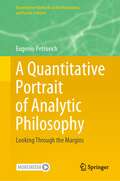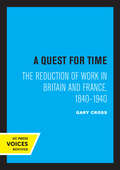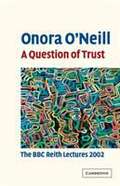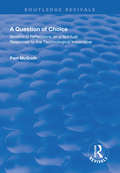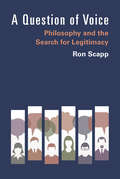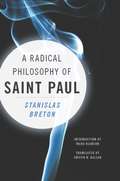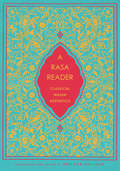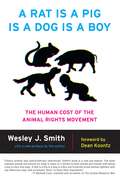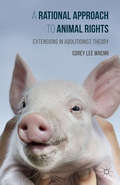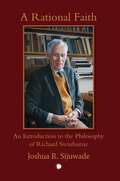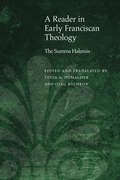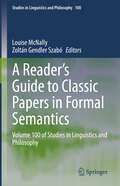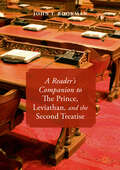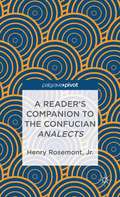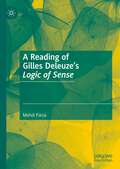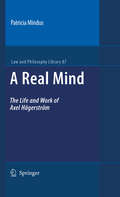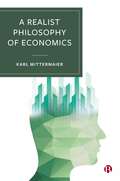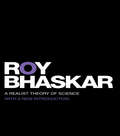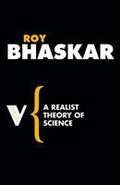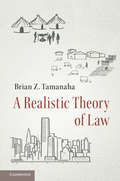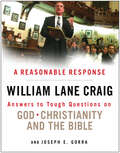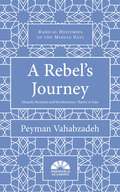- Table View
- List View
A Quantitative Portrait of Analytic Philosophy: Looking Through the Margins (Quantitative Methods in the Humanities and Social Sciences)
by Eugenio PetrovichThis book offers an unprecedented quantitative portrait of analytic philosophy focusing on two seemingly marginal features of philosophical texts: citations and acknowledgements in academic publications. Originating from a little network of philosophers based in Oxford, Cambridge, and Vienna, analytic philosophy has become during the Twentieth century a thriving philosophical community with thousands of members worldwide. Leveraging the most advanced techniques from bibliometrics, citations and acknowledgments are used in this book to shed light on both the epistemology and the sociology of this philosophical field, illuminating the intellectual trajectory of analytic philosophy as well as the social characteristics of the analytic community. Special attention is dedicated to the last forty years, providing insights into a phase of analytic philosophy which is still understudied by historians of philosophy. In the eight chapters of the book, readers will find not only numerous quantitative investigations and technical explanations, but also a robust theoretical framework and epistemological reflections on the strengths and limitations of quantitative methods for the study of philosophy. With its strong interdisciplinary appeal, this book will engage a wide range of scholars, including historians of philosophy seeking new methodologies, analytic philosophers interested in a new look at their discipline, and scholars in digital humanities, bibliometrics, and quantitative studies of science, who will find many innovative techniques for investigating disciplinary fields.
A Quest for Humanity
by Menno BoldtIn A Quest for Humanity, Menno Boldt presents a persuasive new framework for achieving a human social order in the global age. Boldt explores the concept of 'the good society' as a world in which every person can realize their potential for humanity through liberty, social justice, and equal human dignity.A Quest for Humanity innovatively positions globalization as a deterministic phenomenon of expanding interdependence and shared knowledge -- resulting in ever-larger economic and political jurisdictions, but also creating social and psychological links between peoples across the world. Boldt challenges mainstream certainty that Western democracy and constitutional human rights are the exemplary doctrines for the global good society. With a fresh vision designed to inspire a universal acknowledgement of human dignity, A Quest for Humanity powerfully affirms the value of each human being.
A Quest for Time: The Reduction of Work in Britain and France, 1840-1940
by Gary CrossThis title is part of UC Press's Voices Revived program, which commemorates University of California Press’s mission to seek out and cultivate the brightest minds and give them voice, reach, and impact. Drawing on a backlist dating to 1893, Voices Revived makes high-quality, peer-reviewed scholarship accessible once again using print-on-demand technology. This title was originally published in 1989.
A Question Of Trust: The BBC Reith Lectures 2002
by Onora O'NeillOnora O'Neill's timely new work highlights a great paradox: in order to inspire trust, we, the public, require more accountability, more transparency. But the more we learn about our financial institutions, our politicians, our medical practitioners, our clergy, and many other people who have a direct effect on our lives, the less willing we are to trust them. Their word is doubted, their motives questioned. Whether real or perceived, this crisis of trust has a debilitating impact on society and democracy. Can trust be restored by making people and institutions more accountable in a modern democracy? Or do complex systems of accountability and control damage trust? O'nora O' Neill challenges current approaches to accountability, investigates sources of deception in our society and re-examines questions of press freedom. |L O'Neill presented these ideas this spring as a part of the BBC Radio 4's reith Lectures. Established in 1948, the Reith Lectures are presented to advance public understanding about significant issues of contemporary interest. Previous lecturers include Bertrand Russel, Robert Oppenheimer, and J.K. Galbraith.
A Question of Choice: Bioethical Reflections on a Spiritual Response to the Technological Imperative (Routledge Revivals)
by Pamela McGrathFirst published in 1997, this book contributes to our understanding of the way our society responds to issues of death and dying. The trans-disciplinary research which informs this discussion is situated in the disciplines of bioethics and palliative care. Postmodern notions of discourse and power are used to explore the organizational approach of one hospice (Karuna Hospice Service) to working with the dying. In modern, Western technological societies, biomedicine is the dominant discourse which underpins our care of the terminally ill. Bioethics has recently emerged as a discipline concerned with resolving the many ethical dilemmas arising from such a physiological, technologized approach to death. Rather than add to such studies, this research looks into the direction of alternative ways of responding to the dying in our community. KHS was chosen for this research as it presented the possibility of a holistic and spiritual alternative to the positivist, reductionist hegemony of scientific medicine. The research focus is on establishing and describing this difference, and exploring how such an organization could maintain resistance to mainstream medicine. The research findings are shared with the intent of using the material and insights gained to explore important issues presently arising in bioethics and palliative care, for example the recent critique of Principalism in bioethics and the methodological difficulties restricting research into spirituality for palliative care.
A Question of Voice: Philosophy and the Search for Legitimacy
by Ron ScappA Question of Voice: Philosophy and the Search for Legitimacy offers an explicit and comprehensive consideration of voice as a complex of rethinking aspects of the history of philosophy through issues of power, as well as contemporary issues that include and involve the desire for and the dynamics of legitimacy, for individuals and communities. By identifying voice as a significant theme and means by which and through which we might better engage some important philosophical questions, Ron Scapp hopes to expand traditional philosophical discussion and discourse regarding questions about validity, legitimacy, empathy, and solidarity. He offers an innovative perspective that is informed and guided by multiculturalism, ethnic studies, queer studies, feminism, and thinkers and critics such as bell hooks, Barbara Christian, Angela Davis, Jacques Derrida, Michel Foucault, among others. A Question of Voice is an American investigation, but also suggests questions that emanate from contemporary continental thought as well as issues that arise from transnational perspectives—an approach that is motived by doing philosophy in an age of multiculturalism.
A Race Is a Nice Thing to Have: A Guide to Being a White Person or Understanding the White Persons in Your Life
by Janet E. HelmsFor racism to disappear in the United States, White people must take the responsibility for ending it. For them to assume that responsibility, they must become aware of how racism hurts White people and consequently, how ending it serves White people's best interests. Moreover, this awareness not only must be accompanied by enhanced abilities to recognize the many faces of racism, but also by the discovery of options to replace it.
A Radical Philosophy of Saint Paul (Insurrections: Critical Studies in Religion, Politics, and Culture)
by Stanislas BretonStanislas Breton's A Radical Philosophy of Saint Paul, which focuses on the political implications of the apostle's writings, was an instrumental text in Continental philosophy's contemporary "turn to religion." Reading Paul's work against modern thought and history, Breton helped launch a reassessment of Marxism, introduce secular interpretations of biblical and theological traditions, develop "radical negativity" as a critical category, and rework modern political ideas through a theoretical lens. Newly translated and critically situated, this edition takes a fresh approach to Breton's classic work, reacquainting readers with the remarkable ways in which an ancient apostle can reset our understanding of the political. Breton begins with Paul's biography and the texts of his conversion, which challenge common conceptions of identity. He broaches the question of allegory and divine predestination, introduces the idea of subjectivity as an effect of power, and confronts Paul's critique of Law, which leads to an exploration of the logics and limits of agency and power. Breton develops these and other insights in relation to Paul's subversive reflections on the crucified messiah, which challenge meaning and reason and upend our current world order. Neither a coherent theologian nor a stable humanist, Breton's Paul becomes a fascinating figure of excess and madness, experiencing a kind of being that transcends philosophy, secularity, and religion.
A Rasa Reader: Classical Indian Aesthetics (Historical Sourcebooks in Classical Indian Thought)
by Sheldon PollockFrom the early years of the Common Era to 1700, Indian intellectuals explored with unparalleled subtlety the place of emotion in art. Their investigations led to the deconstruction of art's formal structures and broader inquiries into the pleasure of tragic tales. Rasa, or taste, was the word they chose to describe art's aesthetics, and their passionate effort to pin down these phenomena became its own remarkable act of creation.This book is the first in any language to follow the evolution of rasa from its origins in dramaturgical thought—a concept for the stage—to its flourishing in literary thought—a concept for the page. A Rasa Reader incorporates primary texts by every significant thinker on classical Indian aesthetics, many never translated before. The arrangement of the selections captures the intellectual dynamism that has powered this debate for centuries. Headnotes explain the meaning and significance of each text, a comprehensive introduction summarizes major threads in intellectual-historical terms, and critical endnotes and an extensive bibliography add further depth to the selections. The Sanskrit theory of emotion in art is one of the most sophisticated in the ancient world, a precursor of the work being done today by critics and philosophers of aesthetics. A Rasa Reader's conceptual detail, historical precision, and clarity will appeal to any scholar interested in a full portrait of global intellectual development. A Rasa Reader is the inaugural book in the Historical Sourcebooks in Classical Indian Thought series, edited by Sheldon Pollock. These text-based books guide readers through the most important forms of classical Indian thought, from epistemology, rhetoric, and hermeneutics to astral science, yoga, and medicine. Each volume provides fresh translations of key works, headnotes to contextualize selections, a comprehensive analysis of major lines of development within the discipline, and exegetical and text-critical endnotes, as well as a bibliography. Designed for comparativists and interested general readers, Historical Sourcebooks is also a great resource for advanced scholars seeking authoritative commentary on challenging works.
A Rat Is a Pig Is a Dog Is a Boy
by Wesley J. SmithOver the past thirty years, as Wesley J. Smith details in his latest book, the concept of animal rights has been seeping into the very bone marrow of Western culture. One reason for this development is that the term "animal rights" is so often used very loosely, to mean simply being nicer to animals. But although animal rights groups do sometimes focus their activism on promoting animal welfare, the larger movement they represent is actually advancing a radical belief system.For some activists, the animal rights ideology amounts to a quasi religion, one whose central doctrine declares a moral equivalency between the value of animal lives and the value of human lives. Animal rights ideologues embrace their beliefs with a fervor that is remarkably intense and sustained, to the point that many dedicate their entire lives to "speaking for those who cannot speak for themselves." Some believe their cause to be so righteous that it entitles them to cross the line from legitimate advocacy to vandalism and harassment, or even terrorism against medical researchers, the fur and food industries, and others they accuse of abusing animals.All people who love animals and recognize their intrinsic worth can agree with Wesley J. Smith that human beings owe animals respect, kindness, and humane care. But Smith argues eloquently that our obligation to humanity matters more, and that granting "rights" to animals would inevitably diminish human dignity.In making this case with reason and passion, A Rat Is a Pig Is a Dog Is a Boy strikes a major blow against a radically antihuman dogma.
A Rational Approach to Animal Rights: Extensions in Abolitionist Theory
by Corey WrennApplying critical sociological theory, this book explores the shortcomings of popular tactics in animal liberation efforts. Building a case for a scientifically-grounded grassroots approach, it is argued that professionalized advocacy that works in the service of theistic, capitalist, patriarchal institutions will find difficulty achieving success.
A Rational Faith: An Introduction to the Philosophy of Richard Swinburne
by Joshua SijuwadeA comprehensive analysis of Richard Swinburne's intellectual journey and philosophical work, A Rational Faith explores the legacy of one of the most influential and rigorous philosophical defenders of theism. Across Swinburne's written career, he has displayed a deep commitment to demonstrating the intellectual credibility of the Christian faith, facing modern scientific and philosophical challenges and the materialistic worldview of modern intellectualism. Analysing his life and work through in-depth, accessible explanations of key issues and their context, Joshua Sijuwade brings together collected criticism of Swinburne's work and explores possible counter-arguments, alongside a foreword by Richard Swinburne himself. Suitable for any reader interested in Swinburne's 'philosophy-first' approach, or those intrigued by a philosophical defence of the Christian faith, A Rational Faith reveals Swinburne's life and work as a witness to his belief that belief in the central tenets of the Christian faith is rational.
A Reader in Early Franciscan Theology: The Summa Halensis (Medieval Philosophy: Texts and Studies)
by Lydia Schumacher and Oleg BychkovA Reader in Early Franciscan Theology presents for the first time in English key passages from the Summa Halensis, one of the first major installments in the summa genre for which scholasticism became famous. This systematic work of philosophy and theology was collaboratively written mostly between 1236 and 1245 by the founding members of the Franciscan school, such as Alexander of Hales and John of La Rochelle, who worked at the recently founded University of Paris.Modern scholarship has often dismissed this early Franciscan intellectual tradition as unoriginal, merely systematizing the Augustinian tradition in light of the rediscovery of Aristotle, paving the way for truly revolutionary figures like John Duns Scotus. But as the selections in this reader show, it was this earlier generation that initiated this break with precedent. The compilers of the Summa Halensis first articulated many positions that eventually become closely associated with the Franciscan tradition on issues like the nature of God, the proof for God’s existence, free will, the transcendentals, and Christology. This book is essential reading for anyone wishing to understand the ways in which medieval thinkers employed philosophical concepts in a theological context as well as the evolution of Franciscan thought and its legacy to modernity.A Reader in Early Franciscan Theology is available from the publisher on an open-access basis.
A Reader's Guide to Classic Papers in Formal Semantics: Volume 100 of Studies in Linguistics and Philosophy (Studies in Linguistics and Philosophy #100)
by Louise McNally Zoltán Gendler SzabóThis volume contains 21 new and original contributions to the study of formal semantics, written by distinguished experts in response to landmark papers in the field. The chapters make the target articles more accessible by providing background, modernizing the notation, providing critical commentary, explaining the afterlife of the proposals, and offering a useful bibliography for further study.The chapters were commissioned by the series editors to mark the 100th volume in the book series Studies in Linguistics and Philosophy. The target articles are amongst the most widely read and cited papers up to the end of the 20th century, and cover most of the important subfields of formal semantics. The authors are all prominent researchers in the field, making this volume a valuable addition to the literature for researchers, students, and teachers of formal semantics.Chapter 19 is available open access under a Creative Commons Attribution 4.0 International License via link.springer.com.
A Reader’s Companion to The Prince, Leviathan, and the Second Treatise
by John T. BookmanMachiavelli, Hobbes, and Locke each sought a new foundation for political order. This book serves as a reader's companion to Machiavelli’s The Prince, Hobbes’s Leviathan, and Locke’s Second Treatise written for graduate students and scholars seeking a fuller understanding of these classic texts. How do these philosophers respond to perennial questions such as why anyone is ever obligated to obey a government and whether there are any limits to such an obligation. In this book, Bookman begins by sorting out the hermeneutical controversy between textualists and contextualists, offers a chapter-by-chapter commentary on the texts punctuated by questions for the reader’s reflection, and finally suggests a firmer foundation for a theory of political obligation than Hobbes’s and Locke’s consent theories. Also included are bibliographical essays keyed to select bibliographies, providing readers with a wide-ranging, critical review of the secondary literature. Intended to be read alongside the primary work, the work is a full intellectual, critical, and bibliographical history, as well as a fresh examination of three classic texts in political theory and philosophy.
A Reader’s Companion to the Confucian Analects
by Henry Rosemont Jr.Readers of the Analects of Confucius tend to approach the text asking what Confucius believed; what were the views that comprise the 'ism' appended to his name in English? A Reader's Companion to the Confucian Analects suggests a different approach: he basically taught his students not doctrines, but ways for each of them to find meaning and purpose in their lives, and how best to serve their society. Because his students were not alike, his instruction could not be uniform; hence the largenumber of incompatible readings that have been given to what he said. By providing brief essays, finding lists, background and comparative materials, and historical context, this Companion is not intended as another interpretation of the ancient text, but rather as an aid for contemporary students to develop their own interpretive reading of it, in the hope of thereby aiding them in the search for meaning, purpose, and service in their own lives - as seventy-three generations of Chinese have done.
A Reading of Gilles Deleuze’s Logic of Sense
by Mehdi ParsaThis is a reading of Gilles Deleuze’s masterpiece Logic of Sense. It provides a thorough and systematic reading of Deleuze’s book by focusing on the aspects that are neglected in the existing literature. Specifically, the claim that Deleuze’s Logic of Sense provides a convincing answer for the most important question of the history of philosophy regarding the relation between thought and existence as well as the relation between logic and ontology is defended. The answer is that if thought is related to existence, logic is supposed to be, not the logic of essence, but rather the logic of sense. This analysis s pursued respectively through Deleuze’s readings of Frege, the ancient Stoics, Lewis Carroll, Kant, Lautman, Leibniz, and Melanie Klein.
A Real Mind: The Life and Work of Axel Hägerström (Law and Philosophy Library #87)
by Patricia MindusThis comprehensive presentation of Axel Hägerström (1868-1939) fills a void in nearly a century of literature, providing both the legal and political scholar and the non-expert reader with a proper introduction to the father of Scandinavian realism. Based on his complete work, including unpublished material and personal correspondence selected exclusively from the Uppsala archives, A Real Mind follows the chronological evolution of Hägerström's intellectual enterprise and offers a full account of his thought. The book summarizes Hägerström's main arguments while enabling further critical assessment, and tries to answer such questions as: If norms are neither true nor false, how can they be adequately understood on the basis of Hägerström's theory of knowledge? Did the founder of the Uppsala school uphold emotivism in moral philosophy? What consequences does such a standpoint have in practical philosophy? Is he really the inspiration behind Scandinavian state absolutism?A Real Mind places the complex web of issues addressed by Hägerström within the broader context of 20th century philosophy, stretching from epistemology to ethics. His philosophy of law is examined in the core chapters of the book, with emphasis on the will-theory and the relation between law and power. The narrative is peppered with vignettes from Hägerström's life, giving an insightful and highly readable portrayal of a thinker who put his imprint on legal theory. The appendix provides a selected bibliography and a brief synopsis of the major events in his life, both private and intellectual.
A Realist Philosophy of Economics
by Karl MittermaierEPUB and EPDF available Open Access under CC-BY-NC-ND licence. Economic theory relies heavily on the idea of rational action, but how are we to understand the empirical content of rational choice when we can only observe the outcome, not what goes into making the choice? With contributions from Alan Kirman and Rod O'Donnell, Karl Mittermaier's posthumously published work establishes a new conceptual framework that will enable economic theorists to forge new paths of empirical analysis. Introducing readers to the work of a profound thinker who was not recognized in his lifetime, this book, featuring previously unpublished material, is poised to become a seminal text in the philosophy of social sciences.
A Realist Theory of Science (Radical Thinkers Ser.)
by Roy BhaskarFirst Published in 2008. Routledge is an imprint of Taylor & Francis, an informa company.
A Realist Theory of Science (Radical Thinkers)
by Roy Bhaskar<i>A Realist Theory of Science</i> is one of the few books that have changed our understanding of the philosophy of science. In this analysis of the natural sciences, with a particular focus on the experimental process itself, Roy Bhaskar provides a definitive critique of the traditional, positivist conception of science and stakes out an alternative, realist position. Since it original publication in 1975, a movement known as ‘Critical Realism’, which is both intellectually diverse and international in scope, has developed on the basis of key concepts outlined in the text. The book has been hailed in many quarters as a ‘Copernican Revolution’ in the study of the nature of science, and the implications of its account have been far-reaching for many fields of the humanities and social sciences.
A Realistic Theory of Law: Pragmatism And A Social Theory Of Law (Oxford Socio-legal Studies)
by Tamanaha Brian Z.Drawing on philosophical pragmatism, Tamanaha formulates a framework for a realistic approach to socio-legal theory. The strengths of this approach are contrasted with that of the major schools of socio-legal theory by application to core issues in this area. Thus Tamanaha explores theproblematic state of socio-legal studies, the relationship between behaviour and meaning, the notion of legal ideology, the problem of indeterminacy in rule following and application, and the structure of judicial decision making. These issues are tackled in a clear and concise fashion whilearticulating a social theory of law that draws equally from legal theory and socio-legal theory. `This book provides a useful, and at times provocative, review of recent developments in legal theory. Because it covers considerable territory, it should be a good addition to one's professional library . . . there is much to commend in this book. It is well written, ably argued, and generallyknowledgeable. It treats controversial topics forthrightly . . . an excellent review of the legal theory literature. . . . It should provide a worthwhile venture into familiar debates rendered from a perspective that owes allegiance to no side. ' Law and Politics Book Review `by any criterion and excellent book . . . Tamanaha has produced a work which should feature as a core text in jurisprudence courses' Oxford Journal of Legal Studies `This is the most significant piece of work for anybody in Jurisprudence, Socio-Legal Studies, or Legal Theory' Neil MacCormick `a rich insight into almost every question legal theory has vexed itself over the past twenty-five years' Stanley Fish
A Reasonable Response: Answers to Tough Questions on God, Christianity, and the Bible
by William Lane Craig Joe GorraFollowers of Jesus need not fear hard questions or objections against Christian belief. In A Reasonable Response, renowned Christian philosopher and apologist William Lane Craig offers dozens of examples of how some of the most common challenges to Christian thought can be addressed, including:Why does God allow evil?How can I be sure God exists?Why should I believe that the Bible is trustworthy?How does modern science relate to the Christian worldview?What evidence do we have that Jesus rose from the dead?Utilizing real questions submitted to his popular website ReasonableFaith.org, Dr. Craig models well-reasoned, skillful, and biblically informed interaction with his inquirers. A Reasonable Response goes beyond merely talking about apologetics; it shows it in action. With cowriter Joseph E. Gorra, this book also offers advice about envisioning and practicing the ministry of answering people&’s questions through the local church, workplace, and in online environments.Whether you're struggling to respond to tough objections or looking for answers to your own intellectual questions, A Reasonable Response will equip you with sound reasoning and biblical truth.
A Reasonable Response: Answers to Tough Questions on God, Christianity, and the Bible
by William Lane Craig Joe GorraFollowers of Jesus need not fear hard questions or objections against Christian belief. In A Reasonable Response, renowned Christian philosopher and apologist William Lane Craig offers dozens of examples of how some of the most common challenges to Christian thought can be addressed, including:Why does God allow evil?How can I be sure God exists?Why should I believe that the Bible is trustworthy?How does modern science relate to the Christian worldview?What evidence do we have that Jesus rose from the dead?Utilizing real questions submitted to his popular website ReasonableFaith.org, Dr. Craig models well-reasoned, skillful, and biblically informed interaction with his inquirers. A Reasonable Response goes beyond merely talking about apologetics; it shows it in action. With cowriter Joseph E. Gorra, this book also offers advice about envisioning and practicing the ministry of answering people&’s questions through the local church, workplace, and in online environments.Whether you're struggling to respond to tough objections or looking for answers to your own intellectual questions, A Reasonable Response will equip you with sound reasoning and biblical truth.
A Rebel's Journey: Mostafa Sho'aiyan and Revolutionary Theory in Iran (Radical Histories of the Middle East)
by Peyman VahabzadehFollowing the 1953 coup that toppled the democratically elected government of Mossadeq and restored the rule of the Shah in Iran, Mostafa Sho&‘aiyan became a key figure on the country&’s militant left. From a life underground he contributed significantly to the study of Iranian history and politics, and developed a unique theory of revolution. A Rebel&’s Journey provides fascinating insights into the life and work of this singular theoretician. Peyman Vahabzadeh sets Sho&‘aiyan&’s thought in the context of his time and place, and explores how his revolutionary theory might contribute to today&’s expanding movements for social justice and liberation.
